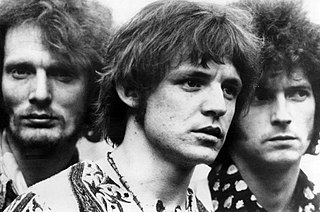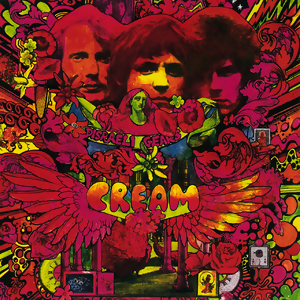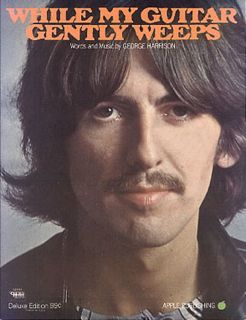
Eric Patrick Clapton is an English rock and blues guitarist, singer, and songwriter. He is regarded as one of the most successful and influential guitarists in rock music. He ranked second in Rolling Stone's list of the "100 Greatest Guitarists of All Time" and fourth in Gibson's "Top 50 Guitarists of All Time". In 2023, Rolling Stone named Clapton the 35th best guitarist of all time. He was also named number five in Time magazine's list of "The 10 Best Electric Guitar Players" in 2009.

Cream were a British rock band formed in London in 1966. The group consisted of bassist Jack Bruce, guitarist Eric Clapton and drummer Ginger Baker. Bruce was the primary songwriter and vocalist, although Clapton and Baker contributed to songs. Formed by members of previously successful bands, they are widely considered the first supergroup. Cream were highly regarded for the instrumental proficiency of each of their members.

Pilgrim is the thirteenth solo studio album by the British rock musician Eric Clapton, released on 10 March 1998 for Reprise Records. The album features all-new studio-recorded material, the first to do so since Clapton's 1989 hit album Journeyman and was nominated for several music awards. Although most of the critics responded negatively to the 1998 studio effort, it was one of Clapton's most commercially successful albums, reaching the Top 10 in twenty-two countries.
Soft rock is a form of rock music that originated in the late 1960s in Southern California and the United Kingdom which smoothed over the edges of singer-songwriter and pop rock, relying on simple, melodic songs with big, lush productions. Soft rock was prevalent on the radio throughout the 1970s and eventually metamorphosed into a form of the synthesized music of adult contemporary in the 1980s.

"Layla" is a song written by Eric Clapton and Jim Gordon, originally recorded with their band Derek and the Dominos, as the thirteenth track from their only studio album, Layla and Other Assorted Love Songs (1970). Its contrasting movements were composed separately by Clapton and Gordon. The piano part has also been controversially credited to Rita Coolidge, Gordon's girlfriend at the time.

Disraeli Gears is the second studio album by the British rock band Cream. It was released in November 1967 and reached No. 5 on the UK Albums Chart., and No. 1 on the Swedish and Finnish charts. The album was also No. 1 for two weeks on the Australian album chart and was listed as the No. 1 album of 1968 by Cash Box in the year-end album chart in the United States. The album features the singles "Strange Brew" and "Sunshine of Your Love", as well as their respective B-sides "Tales of Brave Ulysses" and "SWLABR".

David Thomas Mason is an English singer-songwriter and guitarist from Worcester, who first found fame with the rock band Traffic, and went on to play and record with many notable pop and rock musicians, including Paul McCartney, George Harrison, the Rolling Stones, Jimi Hendrix, Eric Clapton, Michael Jackson, David Crosby, Graham Nash, Steve Winwood, Fleetwood Mac, Delaney & Bonnie, Leon Russell, and Cass Elliot.

John Weldon "J. J." Cale was an American guitarist, singer, and songwriter. Though he avoided the limelight, his influence as a musical artist has been acknowledged by figures such as Neil Young, Mark Knopfler, Waylon Jennings, and Eric Clapton, who described him as one of the most important artists in rock history. He is one of the originators of the Tulsa sound, a loose genre drawing on blues, rockabilly, country, and jazz.

Tu-Plang is the first album released by Australian rock band Regurgitator. After making two EPs, the band chose to record the album in Bangkok, Thailand, to the quandary of its label, Warner Music, which was uncertain as to what terms A&R executive Michael Parisi had contracted. Ely later said, "We didn't want to do it in just any old place, so we had a tour in Europe and Japan booked and our drummer Martin said, 'let's stop in Thailand on the way and check out some studios,' so we did and we found this place."

"While My Guitar Gently Weeps" is a song by the English rock band the Beatles from their 1968 double album The Beatles. It was written by George Harrison, the band's lead guitarist, as an exercise in randomness inspired by the Chinese I Ching. The song conveys his dismay at the world's unrealised potential for universal love, which he refers to as "the love there that's sleeping".

"Tears in Heaven" is a song by English guitarist, singer, and songwriter Eric Clapton and Will Jennings, written about the death of Clapton's four-year-old son, Conor. It appeared on the 1991 Rush film soundtrack. In January 1992, Clapton performed the song in front of an audience at Bray Studios, Berkshire, England for MTV Unplugged, with the recording appearing on his Unplugged album.

Mark Denis Lizotte is an American-born Australian singer-songwriter and musician, who has released material under the name Diesel, Johnny Diesel, as leader of band Johnny Diesel & the Injectors, and as a solo performer, as well as under his birth name. Two of his albums reached No. 1 on the Australian Recording Industry Association (ARIA) Albums Charts, Hepfidelity in 1992 and The Lobbyist in 1993.

"After Midnight" is a rock song by J. J. Cale, first released in 1966. Eric Clapton later covered it for his eponymous album, released in 1970. Clapton's rendition became a success, prompting Cale to re-record the song for his own 1971 album Naturally. In 1987, Clapton later re-recorded the song for a Michelob beer commercial and then released the re-recording as a single. "After Midnight" has been considered one of Clapton's signature songs throughout his career. Other artists covered the song in later years.

Jonathan James Farriss is an Australian drummer and founding member of rock band INXS.

Richard Clapton is an Australian singer-songwriter-guitarist and producer. His solo top 20 hits on the Kent Music Report Singles Chart are "Girls on the Avenue" (1975) and "I Am an Island" (1982). He reached the top 20 on the related albums chart with Goodbye Tiger (1977), Hearts on the Nightline (1979), The Great Escape (1982) and The Very Best of Richard Clapton (1982). Clapton's highest-charting album, Music Is Love (1966–1970), peaked at number 3 on the ARIA Chart.

"Change the World" is a song written by Tommy Sims, Gordon Kennedy, and Wayne Kirkpatrick and recorded by country music artist Wynonna Judd. A later version was recorded by English singer Eric Clapton for the soundtrack of the 1996 film Phenomenon. Clapton's version was produced by R&B record producer Kenneth "Babyface" Edmonds.

"Forever Man" is a song from Eric Clapton's 1985 album Behind the Sun, released as the first single of the album. It reached number one on the Billboard Top Rock Tracks chart, becoming his second single to do so. In total, the single release sold more than 500,000 copies worldwide.

Peter Blakeley is an Australian white soul/adult contemporary singer and songwriter.
The 13th Australian Recording Industry Association Music Awards was held on 12 October 1999 at the Sydney Entertainment Centre. Hosted by Paul McDermott and Bob Downe, and presenters, including Melanie C of the Spice Girls, Tina Cousins, Fiona Horne and Molly Meldrum, distributed 33 awards. The big winner for the year was Powderfinger with four awards.

"Willie and the Hand Jive" is a song written by Johnny Otis and originally released as a single in 1958 by Otis, reaching #9 on the Billboard Hot 100 chart and #5 on the Billboard R&B chart. The song has a Bo Diddley beat and was partly inspired by the music sung by a chain gang Otis heard while he was touring. The lyrics are about a man who became famous for doing a dance with his hands, but the song has been accused of glorifying masturbation, though Otis always denied it. It has since been covered by numerous artists, including The Crickets, The Strangeloves, Eric Clapton, Cliff Richard, Kim Carnes, George Thorogood, The Bunch, and in live performances by The Grateful Dead. Clapton's 1974 version was released as a single and reached the Billboard Hot 100, peaking at No. 26. Thorogood's 1985 version reached No. 25 on the Billboard Rock Tracks chart.


















